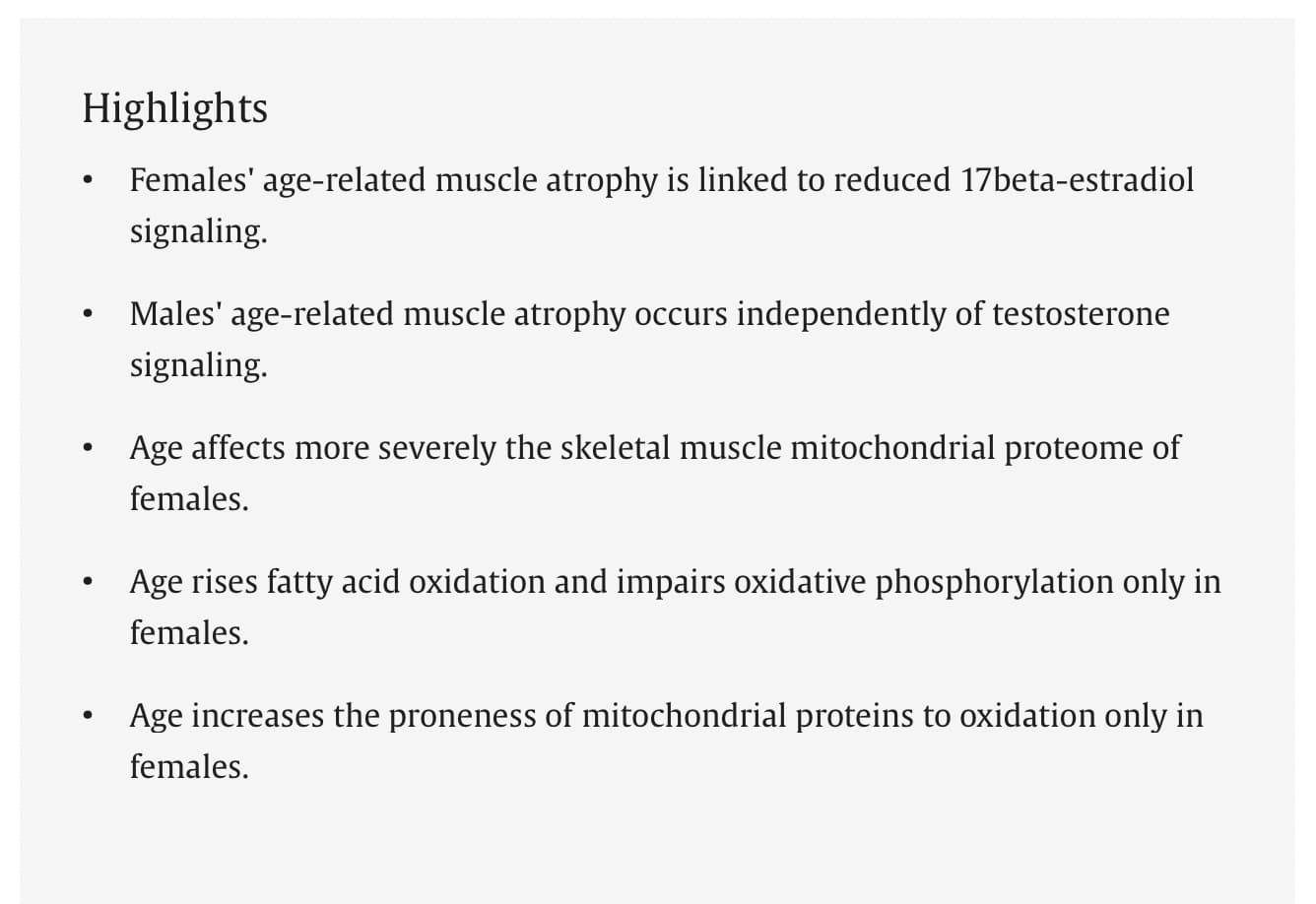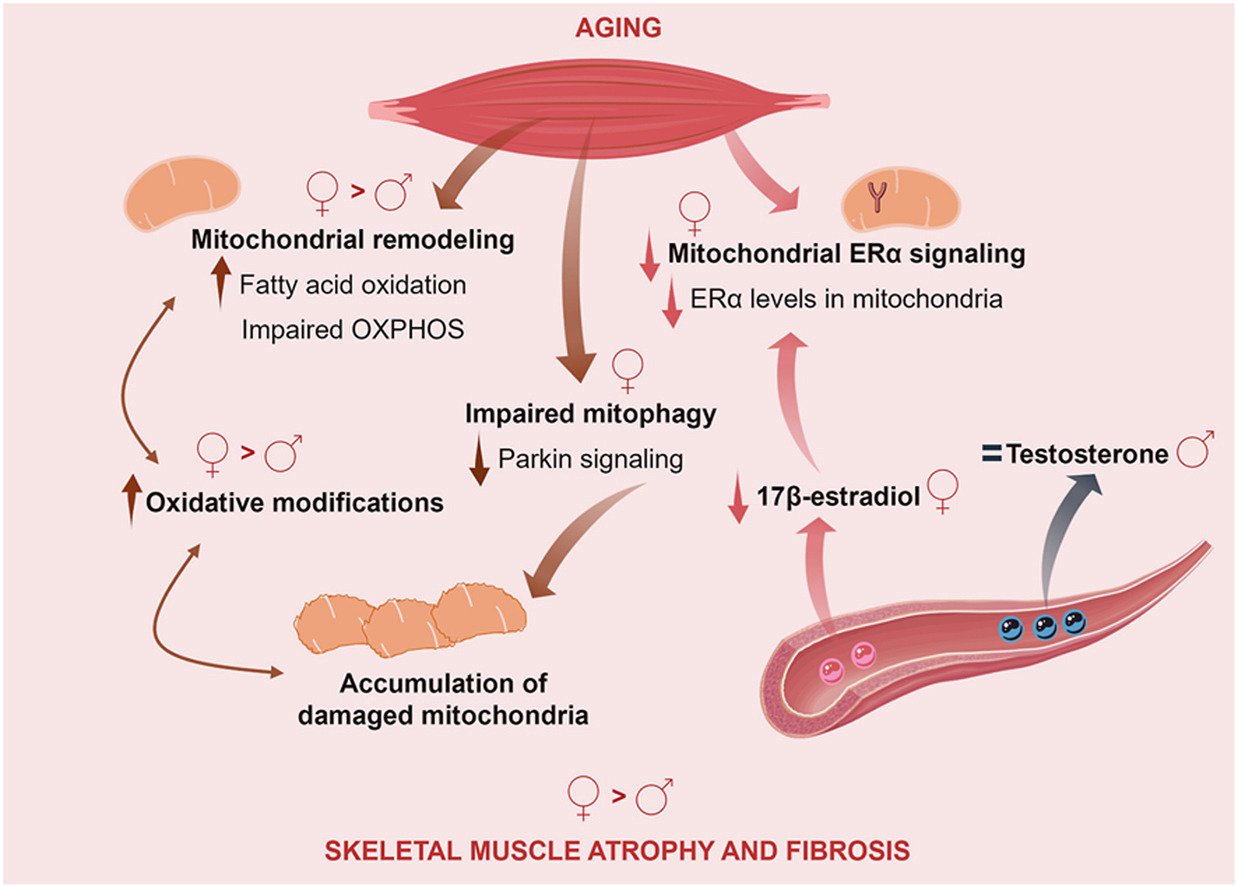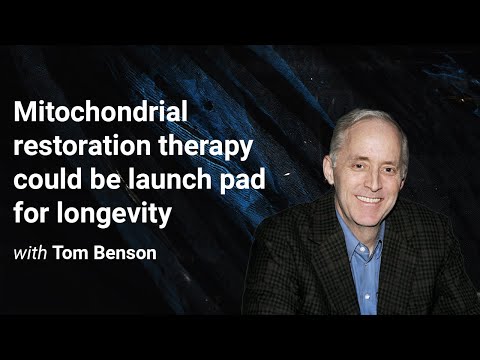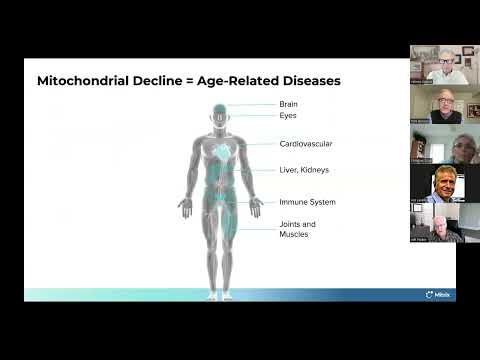Its probably a cost thing.
They do store tissue samples. Other people could do the biomarker studies. Perhaps no one cares about mouse biomarkers.
Mitochondrial remodeling underlying age-induced skeletal muscle wasting: let’s talk about sex
Data demonstrated that age induced skeletal muscle atrophy and fibrosis in both sexes. In females, however, this adverse skeletal muscle remodeling was more accentuated than in males and might be attributed to an age-related reduction of 17beta-estradiol signaling through its estrogen receptor alpha located in mitochondria. The females-specific mitochondrial remodeling encompassed increased abundance of proteins involved in fatty acid oxidation, decreased abundance of the complexes subunits, and enhanced proneness to oxidative posttranslational modifications. This conceivable accretion of damaged mitochondria in old females might be ascribed to low levels of Parkin, a key mediator of mitophagy. Despite skeletal muscle atrophy and fibrosis, males maintained their testosterone levels throughout aging, as well as their androgen receptor content, and the age-induced mitochondrial remodeling was limited to increased abundance of pyruvate dehydrogenase E1 component subunit beta and electron transfer flavoprotein subunit beta. Herein, for the first time, it was demonstrated that age affects more severely the skeletal muscle mitochondrial proteome of females, reinforcing the necessity of sex-personalized approaches towards sarcopenia management, and the inevitability of the assessment of mitochondrion-related therapeutics.
Open access paper:
https://www.sciencedirect.com/science/article/pii/S0891584924001709
That’s interesting. It’s well understood that male testosterone does drop during aging but perhaps that is an effect independent of “aging” but related to something like an accumulation of bad habits which drive testosterone down. Alcohol. Sedentary lifestyles. Poor sleep. Being a Miami Dolphin fan (they always lose).
I listened to the interview. It’s really interesting. I hope they can find the funding. Just taking a bit of a step back. It’s heartening to see companies and individuals pushing to get these therapies into humans.
The next Gerontological Research Group (GRG) online meeting will feature a discussion with Tom Benson on this new trial they are starting:
Our next online meeting will be
Next Saturday JUNE 1, 2024
2:00 pm Pacific / 5:00 Eastern
Time zone converter Time Zone Converter – Time Difference Calculator
Description:
In a groundbreaking talk, Tom Benson Mitrix Bio CEO will discuss their planned 2025 human trials which will attempt the first “130-Year Lifespan” for 15 human volunteers. He will introduce Mitrix Bio’s pioneering technology of using young bioreactor-grown mitochondria, termed “Mitlets,” encapsulated in vesicles to rejuvenate cellular function.
He will underscore their mission to prototype essential components and techniques, aiming for a fundamental advancement in human medicine worldwide.
Zoom Meeting
https://us02web.zoom.us/j/9856129076?pwd=cXFVZHlvSTRkUWZxUWFCVkMvZ3E4QT09&omn=86111155404
I believe it was initially 4 participants, so maybe they’ve found extra funding to include more people? This one will definitely be worth a listen, thanks for posting
Just a reminder to everyone that this is happening this coming Saturday.
William Shatner joins oversight committee for 130-year lifespan trials
How many people want to bet Shatner is a closet Rapamycin taker? ![]()
I’m sure he’ll be first in line to try it. He’s had at least one treatment of stem cells. It wouldn’t surprise me if he’s doing it regularly. He looks fantastic for his age.
I don’t know about rapamycin, but while I think his face looks great, he also seems likely to be a closet diabetic. He looks to be carrying a lot of extra weight, and definitely doesn’t seem to be much of an athlete so I’m surprised he’s lived this long.
Tom tells me they are still recruiting people aged over 70 to participate in this.
I just submitted info inquiring about participating.
Recruiting 70 years olds to crack the 130 year barrier.
So let us wait sixty years to find out.
They have a contact form on their website.
Mitochondria May Have Been Wrongly Accused in DNA Damage
Normal metabolic activity produces reactive oxygen species (ROS) that, if not eliminated, can damage cellular components. As a result, ROS from overactive mitochondria are frequently cited as a source of DNA damage. Despite this longstanding belief, few studies have explicitly demonstrated this linkage.
Tobias Dansen, a redox biologist at the University Medical Center Utrecht, admits that even during his graduate studies, he believed that ROS produced by mitochondria could damage DNA. This idea began changing as he attended more meetings and met biochemists studying redox biology. “You start to realize that actually, to get from the mitochondria into the nucleus and damage the DNA, you have to pass a lot of stuff,” he said, adding that because of ROS’s reactivity, it would likely get caught along the way.
Dansen and his graduate student and study coauthor, Daan van Soest, put this assumption to the test. In a paper published in Nature Communications, the team demonstrated that hydrogen peroxide, a ROS produced by mitochondria, does not diffuse to the nucleus.1 Considering the presence of DNA bases mutated by hydroxy radicals in tumors, the findings support a nuclear source of ROS yet to be identified.
Very interesting would definitely volunteer



